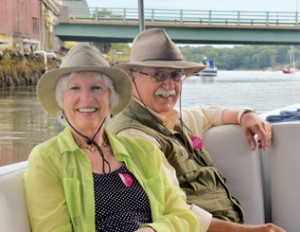by Mary Procter ’59
 “Do we have another revolution in us?” former Boston Globe columnist Ellen Goodman asked Radcliffe alumnae, Class of 1963. At our 50th Reunion we marveled at how far women had come since the days when career options for Radcliffe graduates were limited to being secretaries in publishing houses, fact checkers in magazines, teachers and nurses. A few pioneers in our class actually became physicians and scientists, defending themselves to their male colleagues for most of their careers.
“Do we have another revolution in us?” former Boston Globe columnist Ellen Goodman asked Radcliffe alumnae, Class of 1963. At our 50th Reunion we marveled at how far women had come since the days when career options for Radcliffe graduates were limited to being secretaries in publishing houses, fact checkers in magazines, teachers and nurses. A few pioneers in our class actually became physicians and scientists, defending themselves to their male colleagues for most of their careers.
But Ellen Goodman was talking about the new worries creeping into our consciousness. Some classmates were already nearly full-time caregivers for spouses suffering from dementia of one kind or another. Some had encountered the maze of health organizations and professionals with little guidance on how to navigate it. Many of us had begun to realize that the U.S. system for supporting the end-of-life choices and chronic illnesses of aging people was a mess, far less effective than what was available in other developed countries.
My experience with a couple of significant “disruptive” changes in the status quo — in university coeducation in the 1970s and K–12 education reform in the 21st century — makes me think we need disruptive positive change in how we age.
I am a board member for Capitol Hill Village, the first and largest of about 14 aging-in-place villages in Washington, D.C., and one of the largest villages in the U.S. Opened in 2007, it was inspired by Beacon Hill Village in Boston. About 400 individuals in about 300 households are members. Three hundred volunteers give members rides to medical appointments, help them use their computers, change light bulbs and tend their gardens. Over twenty “affinity groups” offer book clubs, opera clubs, chi gong, caregiving support groups.
However, as members of the Capitol Hill Village, we have a more important role. We are educating each other about what could be in place to make life easier and more enjoyable for us and our family members when we reach frail old age. With our dynamic executive director and founder, now the director of Age-Friendly D.C., we are embarking on developing a neighborhood and city-wide vision. And we are talking about our vision with our elected politicians, local real estate developers, and in local civic gatherings.
For example, having a place where those living with memory loss could go to a kind of daily club where they would be able to learn about current events, create art, sing, dance and exercise right in our neighborhood would be great. Their family members would get time off from caregiving and training about how best to maintain quality of life for someone with memory loss.
What about if, right in our neighborhood, we had a welcoming place to receive temporary or long-term skilled nursing care? Instead of driving across town to a hospital-like building with double rooms off long corridors and dozens of staff with hospital-like specialties, we would walk a few blocks in Capitol Hill to a small apartment building. On each floor, 10 to 12 private rooms would open into a central living-dining-kitchen area. Around-the-clock staff of about eight for each apartment would care for the residents — engage them in conversation, help them dress and bathe, cook for and together with them, organize activities that would interest them. We have our eye on just such an apartment building with skilled nursing apartments in Chelsea, Massachusetts (The Leonard Florence Center for Living).
What are our challenges? Getting people my age (70s and 80s) to face a likely future as a caregiver or care recipient is not easy, until “life comes up and smacks them in the head.” Our potential allies are younger people in their 40s and 50s, newly aware of a broken system as they care for aging parents and wonder why they don’t hear more constructive talk in the media and by politicians.
We talked about this challenge at our Milton 55th reunion in 2014. Two of my Milton classmates, Ann Sheffield and Faith Morrow Williams, are active in their villages in Washington, D.C. I’d love to hear from any of you who live in communities that have developed great solutions for our aging futures. (mprocter@olg.com)



